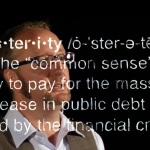 “Austerity confuses virtue with vice,” says professor Mark Blyth, an international political economist at Brown University, who stars in this this video that it makes it really easy to understand why cutting back is bad for the economy as a whole.
“Austerity confuses virtue with vice,” says professor Mark Blyth, an international political economist at Brown University, who stars in this this video that it makes it really easy to understand why cutting back is bad for the economy as a whole.
The video was produced by the Watson Center for International Studies at Brown, of which Blythe is a fellow and he is working on a book with the working title: “Austerity: The History of a Dangerous Idea”
A couple of interesting remarks from the video that are useful for figuring out why auterity measures may sound like common sense when used as political talking points but really don’t stand in a more nuanced look at how the economy functions”
Make no mistake the problem is debt. There is too much of it across the board and we need to clean those public and those private balance sheets. But all these pieces are connected. If the public sector leans these balances sheets at the same time as the private sector. It’s called the fallacy of composition. What’s good for any one household and firm or state is a disaster if we all do it once.
So where does this common sense virtue of austerity leave us? It leaves us in a cycle where those at the bottom end of the income distribution pay for those at the top with the same stagnat nd skewed incomes that now buy less in a more unequal and unstable economy. There’s a term for this: class politics. And it usually ends badly.